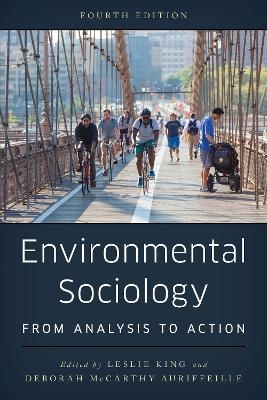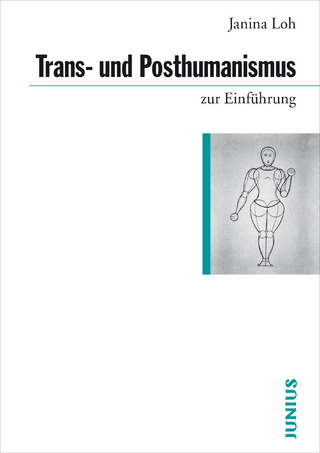
Environmental Sociology
Rowman & Littlefield (Verlag)
978-1-5381-1678-4 (ISBN)
Environmental Sociology: From Analysis to Action illustrates how sociological perspectives can help us better understand the causes and consequences of environmental problems and provides examples of efforts to ameliorate these problems. The fourth edition of this environmental sociology reader includes 22 edited excerpts (10 of them new to this edition) that address, among other things, environmental inequalities, knowledge creation, media, and perspectives on disaster. The selected pieces use a variety of sociological perspectives, including environmental justice, power structure research, ecological modernization, ecological footprint, and more, to examine a wide range of environment-related topics.
New Readings Include:
Chapter 7. The Du Bois Nexus: Intersectionality, Political Economy, and Environmental Injustice in the Peruvian Guano Trade in the 1800s.
Brett Clark, Daniel Auerbach and Karen Xuan Zhang
Chapter 8. Ruin’s Progeny: Race, Environment, and Appalachia’s Coal Camp Blacks.
Karia L. Brown, Michael W. Murphy and Appollonya M. Porcelli
Chapter 9. Environmental Apartheid: Eco-health and Rural Marginalization in South Africa
Valerie Stull, Michael M. Bell and Mpumelelo Ncwadi
Chapter 12. Legitimating the Environmental Injustices of War: Toxic Exposures and Media Silence in Iraq and Afghanistan.
Eric Bonds
Chapter 15. Left to Chance: Hurricane Katrina and the Story of Two New Orleans Neighborhoods
Stever Kroll-Smith, Vern Baxter and Pam Jenkins
Chapter 17. Environmental Threats and Political Opportunities: Citizen Activism in the North Bohemian Coal Basin
Thomas E. Shriver, Alison E. Adams, and Stefano B. Longo
Chapter 19. Ontologies of Sustainability in Ecovillage Culture: Integrating Ecology, Economics, Community, and Consciousness
Karen Liftin
Chapter 20. Plans for pavement or for people? The Politics of Bike Lanes on the ‘Paseo Boricua’ in Chicago, Illinois
Amy Lubitow, Bryan Zinschlag, and Nathan Rochester
Chapter 21. Campus Alternative Food Projects and Food Service Realities: Alternative Strategies
Peggy F. Barlett
Chapter 22. From the New Ecological Paradigm to Total Liberation: The Emergence of a Social Movement Frame
David N. Pellow and Hollie Nyseth Brehm
Leslie King is Associate Professor of Sociology and Environmental Science and Policy at Smith College. Her areas of interest include population studies, environmental sociology and social movements. Her most recent research investigates corporatization of social movement activism. Debbie McCarthy Auriffeille is Associate Professor of Sociology in the Sociology and Anthropology Department at the College of Charleston. Her areas of research have included environmental justice and sustainable lifestyles. She is currently completing a project on green parenting.
Preface
Introduction
PART I
Imagining Nature
Chapter 1. Nature’s Looking Glass
Hillary Angelo and Colin Jerolmack
PART II
Political Economy
Chapter 2. Why Ecological Revolution?
John Bellamy Foster
Chapter 3. The Unfair Trade-off: Globalization and the Export of Ecological Hazards
Daniel Faber
Chapter 4. The Tragedy of the Commodity: The Overexploitation of the Mediterranean Bluefin Tuna Fisher
Stefano B. Longo and Rebecca Clausen
Chapter 5. Ecological Modernization at Work? Environmental Policy Reform in Sweden at the Turn of the Century
Benjamin Vail
Chapter 6. A Tale of Contrasting Trends: Three Measures of the Ecological Footprint in China, India, Japan, and the United States, 1961–2003
Richard York, Eugene A. Rosa and Thomas Dietz
PART III
Race, Class, Gender and the Environment
*Chapter 7. The Du Bois Nexus: Intersectionality, Political Economy, and Environmental Injustice in the Peruvian Guano Trade in the 1800s.
Brett Clark, Daniel Auerbach and Karen Xuan Zhang
*Chapter 8. Ruin’s Progeny: Race, Environment, and Appalachia’s Coal Camp Blacks.
Karia L. Brown, Michael W. Murphy and Appollonya M. Porcelli
*Chapter 9. Environmental Apartheid: Eco-health and Rural Marginalization in South Africa
Valerie Stull, Michael M. Bell and Mpumelelo Ncwadi
Chapter 10. Turning Public Issues into Private Troubles: Lead Contamination, Domestic Labor, and the Exploitation of Women
Lois Bryson, Kathleen McPhillips, and Kathryn Robinson
PART IV
Media
Chapter 11. Media Framing of Body Burdens: Precautionary Consumption and the Individualization of Risk
Norah MacKendrick
*Chapter 12. Legitimating the Environmental Injustices of War: Toxic Exposures and Media Silence in Iraq and Afghanistan.
Eric Bonds
Part V
Disaster
Chapter 13. The BP Disaster as an Exxon Valdez Rerun
Liesel Ashley Ritchie, Duane A. Gill, J. Steven Picou
Chapter 14. Silent Spill: The Organization of an Industrial Crisis
Thomas D. Beamish
*Chapter 15. Left to Chance: Hurricane Katrina and the Story of Two New Orleans Neighborhoods
Stever Kroll-Smith, Vern Baxter and Pam Jenkins
PART VI
Social Movements
Chapter 16. People Want to Protect Themselves a Little Bit: Emotions, Denial, and Social Movement Nonparticipation
Kari Marie Norgaard
*Chapter 17. Environmental Threats and Political Opportunities: Citizen Activism in the North Bohemian Coal Basin
Thomas E. Shriver, Alison E. Adams, and Stefano B. Longo
Chapter 18. Politics by Other Greens: The Importance of Transnational Environmental Justice Movement Networks
David Naguib Pellow
PART VII
Changes in Progress
*Chapter 19. Ontologies of Sustainability in Ecovillage Culture: Integrating Ecology, Economics, Community, and Consciousness
Karen Liftin
*Chapter 20. Plans for pavement or for people? The Politics of Bike Lanes on the ‘Paseo Boricua’ in Chicago, Illinois
Amy Lubitow, Bryan Zinschlag, and Nathan Rochester
*Chapter 21. Campus Alternative Food Projects and Food Service Realities: Alternative Strategies
Peggy F. Barlett
*Chapter 22. From the New Ecological Paradigm to Total Liberation: The Emergence of a Social Movement Frame
David N. Pellow and Hollie Nyseth Brehm
*Denotes new selections
| Erscheinungsdatum | 27.04.2019 |
|---|---|
| Verlagsort | Lanham, MD |
| Sprache | englisch |
| Maße | 157 x 231 mm |
| Gewicht | 440 g |
| Themenwelt | Sozialwissenschaften ► Soziologie |
| Technik ► Umwelttechnik / Biotechnologie | |
| ISBN-10 | 1-5381-1678-2 / 1538116782 |
| ISBN-13 | 978-1-5381-1678-4 / 9781538116784 |
| Zustand | Neuware |
| Haben Sie eine Frage zum Produkt? |
aus dem Bereich


